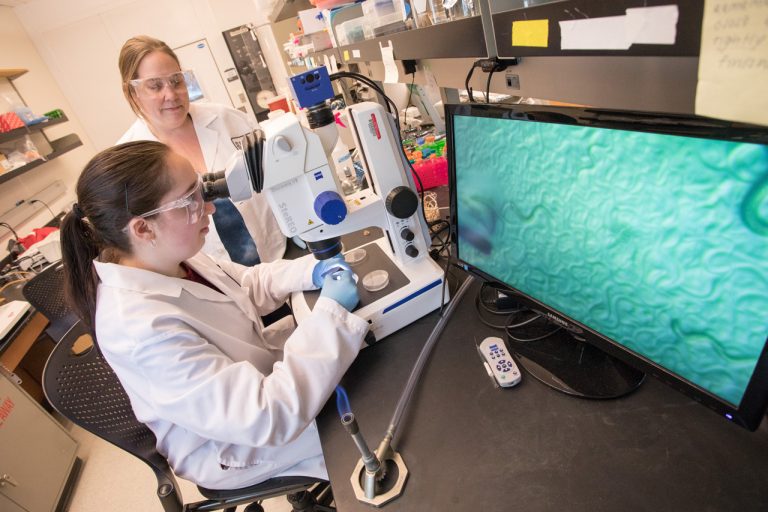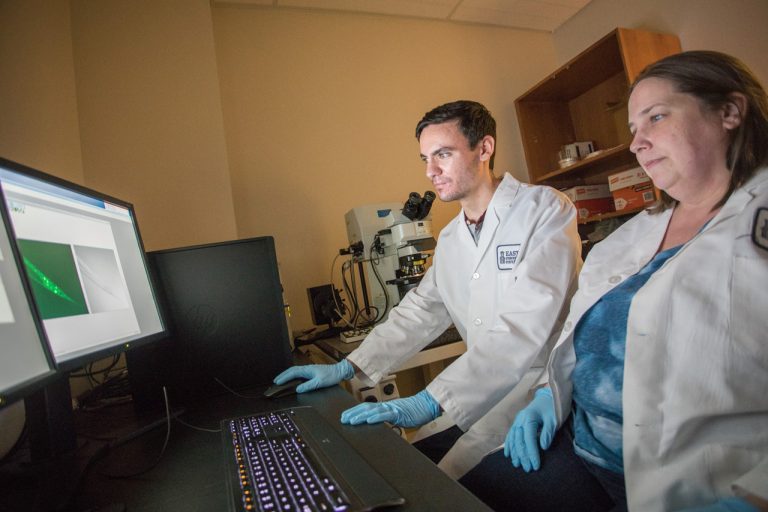- Apply
- Visit
- Request Info
- Give
Eastern Students Assist in Biology Research Project
Written by Anne Pappalardo
Published on March 07, 2018

Undergraduate research and creative activities at Eastern Connecticut State University provide opportunities for students to work closely with faculty mentors on research or creative work. Projects are aligned with the faculty mentor's expertise and designed to expose students to professional activities within a chosen field. Specific activities vary with each experience and by discipline.
Eastern Connecticut State University Biology majors Christianne Senechal '18 of Amston and Jonathan Rappi '18 of Southington are assisting Eastern Biology Professor Amy Groth with a complex research project that uses microscopic worms to study genes that are important for human development and disease, including cancer.

During her research, Senechal has learned the dedication it takes to achieve results. "The research that I have done at Eastern has helped me learn to think critically and persevere," said Senechal. "These values are important regardless of what path someone takes. I never thought that research would be a path I would consider taking, but I have come to enjoy the process very much and believe that what I have learned will carry over into whatever career I pursue." said Senechal.
"The biggest lesson I have learned is that science takes a very long time and lots of trial and error," said Rappi. "Of the results that we did achieve, I was surprised one gene that was inhibited seemed to cause the worms to develop more slowly than usual. We could observe this phenomenon with a normal microscope because the worms without this particular gene were smaller than normal. This observation showed me the power of genetics."

"All of the research in Eastern's Biology Department is conducted by our extremely talented undergraduates in collaboration with a faculty member," said Groth, who teaches courses in genetics, biotechnology, molecular genetics and the biology of cancer. "The student researchers are utilizing cutting-edge techniques such as RNA interference and confocal microscopy to study genetic pathways in nematodes. The findings will shed light on how those pathways function in human development and disease."
The students believe that undergraduate research benefits students because it provides them with a true appreciation for the amount of work, dedication and effort that is involved, and that it is an opportunity for students to build relationships with professors by working closely with them.
"It also helps students to learn in a different way than in a normal classroom setting. Students must be creative and solve unique problems rather than just memorize information for a test," said Rappi.
"When performing independent research, students learn the variability in research, including how to devise protocols that work for their own experiments and how there are often a number of explanations for why things may go wrong," said Senechal. "and since undergraduate research is performed under the mentorship of a professor, there is always someone for the student to turn to when they need help."
"Professor Groth helps determine the direction of my research. We often spend time discussing the results of my experiments and how we should proceed based on those results," explains Senechal. "She supervises me when I am learning how to carry out protocols for different procedures, until I am capable of working on them independently. Since my research is essentially a branch of her area of research, Professor Groth is a knowledgeable resource who I can turn to when I am unclear on direction."
Rappi also credits Groth with guiding him through the research process by offering suggestions, answering questions and teaching him laboratory techniques. "She encourages me to take charge of my project and to be independent."
After graduating, Senechal plans to take a year off to conduct more research or work as a medical assistant before applying to medical school. Her interests include medical genetics, emergency medicine and specialties such as oncology. Rappi is interested in pursuing a research career.
Both will be presenting their research at two research conferences in April; Eastern's Celebrating Research Excellence an Artistic Talent at Eastern conference and the Eastern Colleges Science Conference in Ithaca, NY.


